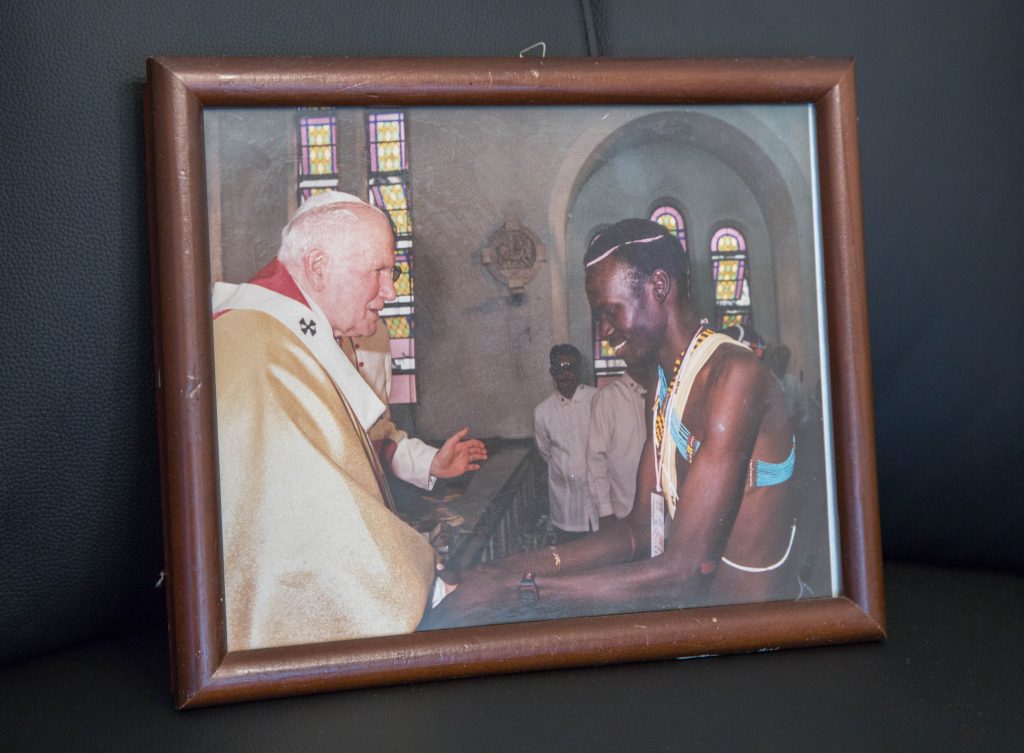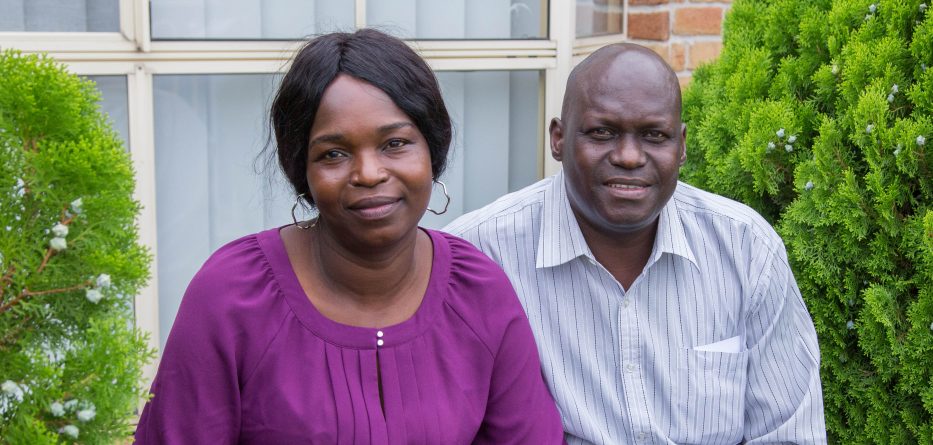As a refugee from South Sudan who fled a civil war in 1995, John Cinya said that the church has always been a safe place for him.
“My love is always in the church. When we came to Australia, we didn’t know anybody, we had no friends. Our friend is the church. The church has become a place of safety for me and for my community.”
John, as well as Thong Nguyen, Roderick Pirotta and Roque Dias will be ordained to the diaconate on 22 February 2019 at St Patrick’s Cathedral, Parramatta.
John, and his wife Margaret Wani Foni, who recently celebrated their 18th wedding anniversary, were married in a traditional African ceremony in 2001 at the Adjumani Refugee Camp in Uganda. In 2006, they were married in Australia at Our Lady, Queen of Peace Parish, Greystanes. John and Margaret have four children – Gloria, Peter, Daniel and Simon.
John and Margaret were childhood friends before the civil war separated them.
“We grew up in the same village in Nimule [in South Sudan, near the border with Uganda] and our fathers were friends. My dad was a businessman, and John’s dad was an accountant, so when my dad went to the city to buy goods for his store, John’s dad helped,” Margaret said.
“I received my refugee status after living at the Punyido Refugee Camp in Ethiopia for four years. From there, I moved to Australia in March 1998. I knew I was going to marry Margaret, so I went to Uganda to get married in 2001,” John said.
“I was living in the Ugandan refugee camp since 1989. I was able to come to Australia in July 2002 because I married John,” Margaret said.
John has been a long-standing employee of Catholic Education Diocese of Parramatta as a Schools Liaison Officer, working with the schools in the diocese and the Sudanese community since 2005. Margaret is an assistant nurse at an aged care facility and is in her final year of study of nursing at Western Sydney University.
Both John and Margaret have been studying full-time and working full-time whilst managing family life and church commitments. “My wife has been very patient and supportive in my vocation,” John said.
John’s inspiration to joining to permanent diaconate was fostered by his father’s seminarian past.
“My father, who was the eldest son, was in the seminary and had done all of the studies. He was in his final year and in the African culture, the son needs to get consent from the parents to become a priest,” John said.
“His parents said no, so he was not ordained and left the seminary,” Margaret added.
“I was always involved in the church. My siblings and I were altar servers, we were in the choir, we were youth leaders. When I was at university, I was the president of the St Augustine Society,” John said.
“In 2002, the Sudanese Catholic Bishops Conference were receiving requests from Australian dioceses to send Sudanese priests to Australia for pastoral work, but the Sudanese bishops could not allow them to be sent.
“In 2011, then-Bishop Anthony Fisher asked me to consider being a deacon to assist the Sudanese community, as there was a lack of priests in the community.
“There’s a moral responsibility to do the work of the church, not only for the Sudanese community for but for the wider church.
“When Sudanese Cardinal Gabiel Zubeir Wako came to Australia for World Youth Day 2008 in Sydney, he said ‘you have to grow your own priests here.’
“By being in the diaconate program, the young people in the community see me as an example of service to the Church.”
For Margaret, John’s commitment to the diaconate was the next step in his service to the church.
“John was already devoted to the church, so it was something he was already able to do.
“By becoming a deacon, John believes he can do more for Christian life than as an individual in the church.
“A deacon needs to be the light and the example for the parish,” she said.
“Because our children grew up in Australia, and we always go to church together, they don’t see the difference. They see that ‘daddy is up there with the priest’ first as an acolyte, but now as a deacon,” John said.
“It’s just normal for them,” Margaret added.
While in Sudan during the civil war, John experienced a lot of hardships because of his religion.
“When I was living and studying in Khartoum [the capital of Sudan], whose population was predominately Muslim, life was difficult for me as a Christian.
“In the north, if you had a Christian name like ‘John’, and even if you are a university graduate, you wouldn’t be employed.
“During the war, Christians from the south were being tortured the Arab Muslim government in the north. Churches were also burnt down and destroyed.
“In 1995, I went to World Youth Day in Manila on behalf of the youth of Sudan, where I met with Pope John Paul II.
“During the final Mass, I gave a testimony about life as a Christian in Sudan, which got me into trouble with the Sudanese government.”

A photograph of John Cinya meeting with St Pope John Paul II during World Youth Day 1995 in Manila, Philippines. Image: John Cinya.
Upon reaching Australia, John did whatever he could to assist his community.
“When I came to Australia as a refugee, I had nothing. I had two pairs of pants and two shirts.
“During the war in Sudan, the Catholic Church protected the people. So, my community went to the church to help us start our new lives in Australia.
“In 2002, I was the chairman of the Sudanese Australian Catholic Community and we asked the Archdiocese of Sydney and the Diocese of Parramatta for assistance, which included a pastoral care worker, transportation and helping with school fees.
“I go and visit the homebound every Sunday and give communion and pray with them and their families. I speak with them and I am present with them.
“When the Sudanese community moved to Blacktown, because a lot of parents have limited English, I helped the sacramental team by explaining the sacraments to the parents to help them understand.
“Around five years ago, we tried to incorporate and register the Sudanese kids with the rest of the parish children [at Mary, Queen of the Family Parish, Blacktown] for the sacraments of Reconciliation and Confirmation. Now our kids are putting their hands up, answering questions in lessons and understanding the sacraments.
“To me, the deacon is a servant to the community and a proclaimer of the Gospel.
“Deacons need to be with and help the community. Even historically in the time of the apostles, they were there with the people, which is what the deacon should be.
John and Margaret are very encouraging of any men wishing to join the permanent diaconate.
“Any men coming forward and contributing to the church is a good thing. As the wife of a deacon, being there to support them is our contribution to their ministry,” Margaret said.
“The diaconate is a wonderful vocation,” John said.
“The most important part of my ordination will be when Bishop Vincent Long places his hands on my head. It will be a blessing on my life and a blessing for my family.
“I would like to thank Bishop Vincent. He is very inspirational to me. His life as a refugee is similar to mine, it has given me encouragement.”








